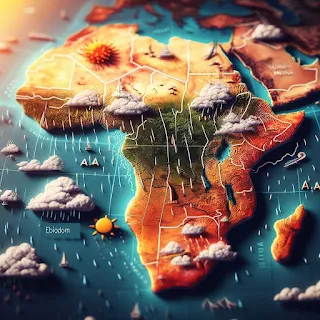As the African continent fractures in two and its shape changes, it alters the world's weather by changing heat and moisture distribution.
The Earth's surface is not static; it's constantly evolving, shaped by geological processes that play out over vast periods. One of the most striking examples of this transformation is occurring on the African continent, where the land gradually splits into two distinct parts. This awe-inspiring phenomenon is unfolding along the East African Rift, a colossal fracture in the Earth's crust that stretches over 1,864 miles or 3,000 kilometers.
The gradual splitting of the African continent is like a giant puzzle with pieces moving apart, and it's changing the way the Earth's weather works, especially in places like the United States and the Caribbean. Africa breaking apart and creating powerful storms like hurricanes are unrelated, but they are connected surprisingly.
African Land Evolution and the Weather Impact
Imagine a special zone near the equator where winds from the north and south meet; we call it the Inter-Tropical Convergence Zone (ITCZ). This zone is where warm, moist air rises, creating the perfect conditions for big storms, including hurricanes.
With its massive size and features, Africa plays a huge role in this zone's behavior. It's like a heat machine, taking in sunlight and releasing it into the air. The Sahara Desert in northern Africa is especially important in this process. It's super hot, and when its scorching air meets the cooler, moist air from the south, it shifts the ITCZ northward during the Northern Hemisphere's summer.
So, here's where the continental rift in Africa comes into play. As the continent slowly breaks apart and changes shape, it messes with how heat and moisture move around. This moves the ITCZ and disturbs the usual air movement patterns, affecting weather patterns, including how hurricanes form and where they go. It's like a domino effect – changes in one place cause a chain reaction of changes in weather thousands of miles away.
Now, Africa doesn't just affect the weather with continental rifts; it also sends another surprise thousands of miles across the Atlantic to the Americas. It's called the Saharan Air Layer (SAL), like a layer of hot, dry, and dusty air that starts in the Sahara Desert.
This dusty air travels across the ocean, reaching places like the Caribbean and the southeastern United States. When it arrives, it's not great for air quality and uncomfortable for people with allergies or asthma. On the upside, it creates mesmerizing sunsets by specially scattering sunlight.
This dusty, hot air also makes things warmer, creating hotter and drier conditions in the regions it reaches. But the most incredible thing is that this layer of air acts as a shield against hurricanes in the Atlantic Ocean. Remember, hurricanes need warm and moist air to grow stronger, but the dry and dusty SAL disrupts their structure and weakens them, reducing the impact of these storms in hurricane-prone areas.
Changes in heat and moisture distribution influence ocean circulation patterns. As the African continent transforms and influences climate systems, it indirectly impacts ocean currents. These currents play a crucial role in the distribution of nutrients and temperature in the oceans, which, in turn, affect the habitats and behaviors of marine life.
The African continent's changes and weather effects are like puzzle pieces in a grand global weather game. It's a reminder that our planet is a complex and interconnected system, where what happens in one place has a ripple effect on weather patterns and events far, far away.


























